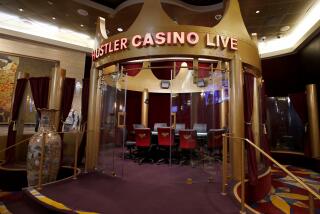Pitchman Savalas Helps, But Will Players Club Ever Hit the Jackpot?
- Share via
CALABASAS — During the 1970s, Telly Savalas was on network television each week starring as Theo Kojak, a tough-talking, lollipop-sucking cop. Now, Savalas is a regular on television again, but as the pitchman for Players Club International.
The club offers casual gamblers discounts of 25% to 60% on hotel rooms, meals and entertainment at such gaming resorts as Atlantic City, N.J.; Las Vegas and the Caribbean. The commercials have made Savalas and his bald pate a familiar sight on cable television, where most of the ads run on such channels as Arts & Entertainment, ESPN and super station WTBS.
The ads also have been the spark that the fledging company needed to boost membership in its club, which costs $125 a year.
Back in August, 1986, Players had only 26,000 members and was losing money like a high roller with a streak of bad luck. At the end of its first two fiscal years, Players Club’s parent company, Players International, lost nearly $1.7 million while taking in only about $5 million in revenue.
So the company resorted to hiring a famous name to sell its product. Since the Savalas campaign began, memberships have nearly doubled, to 50,000. While the Savalas commercials have boosted memberships, the television ads also have swelled marketing costs, and the company has yet to make substantial profit.
$125 Spent per Member
In the year ended March 31, the company spent $4 million on marketing, nearly matching the $4.3 million it took in revenue. The company estimates it spends $125 in marketing costs to bring in one new member, the amount members pay to join.
As a result, Players’ executives expect to merely break even this fiscal year. For the first six months ended Sept. 30, the company made a small profit of $58,100 on revenue of $3.7 million.
The stock, meanwhile, has not developed much of a following. Its value has plunged about 70% from the $4 a share it traded at a year ago. Although the October stock market crash accounted for some of the drop, more than half of it came before the market tumble.
Company executives say the stock dropped, in part, because restrictions that prevent trading expired this year on some stock that early investors received, putting more shares of the thinly traded stock on the public market.
One clear beneficiary of the new campaign is Savalas. For doing a couple of commercials a year, Savalas gets $250,000 in cash, according to company filings with the Securities and Exchange Commission. Under the one-year contract, which expires in April, he instead may get 5% of the membership fees if the amount exceeds the $250,000, the filings show.
Savalas’ cash income is a 67% raise from the $150,000 he received in the first year he did the commercials. Under his contract, Savalas also gets 230,000 shares of stock, on top of the 200,000 the SEC filings say he was entitled to in the first year he worked for Players.
Players was founded in 1985 by brothers Edward and David Fishman, who previously promoted casino gaming tournaments. The two saw that “high rollers,” or gamblers who might routinely drop $100,000 a year at a casino, typically receive hotel rooms and meals free because they bring in so much money at the tables.
The two decided to form the club for what are often called “middle rollers”--those who visit casinos a few times a year and may spend roughly $200 to $2,000 a visit. The Fishmans brought in Stanley Harfenist, a former video game executive who serves as president. The trio and other insiders control about 60% of the company’s stock.
In 1985, the company commissioned a market study of how audiences would respond to a number of celebrities. Players Vice Chairman David Fishman says Savalas finished far ahead of other celebrities considered, with Jack Klugman, star of the 1970s television show “Quincy,” a distant second.
Associated With Gambling
It also helped that Savalas is publicly associated with gambling, partly because he hangs around casinos and because of his co-ownership of the thoroughbred “Telly’s Pop,” winner of numerous races in the mid-1970s.
“He’s had the image for years,” said his agent, Charles Stern. “I can remember him going to casinos and hotels in Vegas for as long as I’ve known him. When he was doing ‘Kojak,’ sometimes he would finish at 6 or 7 o’clock at night, take a plane to Vegas and be back to go to work the next day.”
A few years ago, Savalas made a $1 million a year as spokesman for Ford. Stern said he typically gets 30 to 40 pitches a year for commercials for Savalas. Stern and Savalas say they turned Players down at first, but gave in after Players persisted and Stern was able to check out the company to make sure it was legitimate. Getting stock also helped.
“Obviously, there is an incentive to it. If we do good, then the stock will become more valuable,” Savalas said.
The company uses every opportunity to link itself with Savalas, printing his picture on newsletters and stationery and even keeping its members updated on his career with a “Telly Gram” section in its monthly newsletter.
Telemarketing Firms
Memberships are largely sold by telephone, mostly by telemarketing firms under contract that staff a room full of solicitors who call prospective customers, and take orders from customers calling toll-free numbers listed in commercials.
Players has become involved in a dispute with one marketer, Mardex Inc. in Omaha, which sued Players last fall in Van Nuys Superior Court for allegedly failing to pay $26,000. It also accuses the company of taking unauthorized credits on its billings from Mardex and trying to reduce charges retroactively because of membership cancellations.
David Fishman counters by alleging that Mardex had an unusually high rate of cancellations on memberships it sold because the firm pushed sales by emphasizing a 90-day, money-back guarantee. He said that resulted in the program’s being sold to a large number of people who really didn’t want it, but figured they had nothing to lose because of the guarantee.
Players now is affiliated with 19 hotels with casinos and five cruise ships. For the resorts, which pay nothing, the club gives them a steady stream of customers to boost occupancy, particularly during off-season periods and on weekdays when fewer people stay.
Players executives say they limit the number of hotels that can participate, in part so they won’t alienate the ones they already have signed up. In addition, the club isn’t for hotels catering to wealthy clients, such as Trump Plaza Hotel & Casino in Atlantic City and Caesars Palace and the Desert Inn in Las Vegas.
‘Viable Club’
“It is a very, very viable club for the mid-range customer. The only problem at our property is that we are geared to the high end. We didn’t have enough rooms to accommodate their players,” said Timothy Rose, director of marketing for Trump Plaza Hotel, which is owned by New York real estate tycoon Donald Trump and which formerly used Players.
But Resorts International, which Trump controls, uses Players because it has more rooms to fill, said Bill Blaziek, senior vice president. He added that the company will probably use it when Resorts’ giant Taj Mahal project opens in Atlantic City next year.
In addition to soliciting memberships, Players has diversified by starting a travel agency for members and marketing instant-teller machines, made by an American Express subsidiary, which are placed in casinos. Players receives an undisclosed fee for each transaction at the machines, which allow members to withdraw money using their credit cards.
But, to be successful, the company must get members to renew each year because that will give it a steady stream of money with little or no marketing costs involved. So far, about 65% of its members are renewing.
If renewals in the fledging club continue, Players International and its stockholders, including Savalas, may well hit the jackpot. If not, it could be snake eyes.
Founded in April 1985, Players International’s main business is operating Players Club International in which members pay an annual fee for discounts on rooms, food and entertainment at gaming resort hotels. Players International is based in Calabasas and has 7.7 million shares of stock outstanding.
More to Read
The biggest entertainment stories
Get our big stories about Hollywood, film, television, music, arts, culture and more right in your inbox as soon as they publish.
You may occasionally receive promotional content from the Los Angeles Times.










